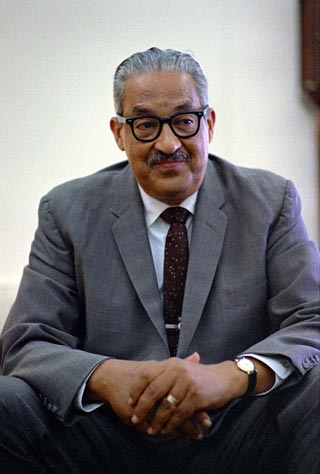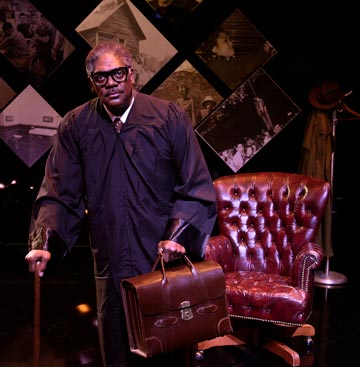Play (2006)
by George Stevens, Jr.
Directed by Benny Sato Ambush
New Repertory Theatre
Arsenal Center for the Arts
Watertown, MA
January 7 – February 9, 2017
Featuring Johnny Lee Davenport as Thurgood Marshall

Thurgood Marshall (1908-1993) was the first African-American to be appointed to the Supreme Court. It was 1967 and Lyndon Johnson was president; Johnson had already tapped Marshall to be Solicitor General earlier in his term. Marshall served on the high court for twenty-four years, retiring in 1991, distinguishing himself as a jurist who supported liberal positions, notably abortion rights and opposition to the death penalty.
Before he became a judge, Marshall was an attorney for the NAACP and in 1954 earned his reputation by winning the landmark case Brown vs. The Board of Education of Topeka which he argued before the Supreme Court. That victory overturned a precedent established by the case Plessy vs. Ferguson (1896), which decreed that segregated schools conceived as separate but equal were constitutional. Marshall’s victory with Brown was a sea-change in education and paved the way, over the coming decades, for enforcement of integrated schooling.
Following a chronological scheme, this wonderfully written one-person play tells its story concisely and straightforwardly. Set, putatively, in a lecture hall at Howard University, the play is cast as a recounting by Marshall as an old man of his life and career.
A simple array of pictures on the back wall of the small stage represents characters in Marshall’s life; as each character is invoked, a small spotlight is shone on the portrait in question.

Photo: Andrew Brilliant / Brilliant Pictures
Courtesy of New Repertory Theatre
There is both considerable detail and considerable humor in the rendition, and Johnny Lee Davenport does a great job of managing the considerable body of details and narratives; as well, he gives a warm and engaging portrait of Marshall himself. It’s an amazingly compelling performance.
The portrait drawn is of someone incredibly hard-working, astute and authoritative who, in addition, exhibits a good amount of humility and vulnerability.
Accounts of his two marriages – Marshall’s first wife died of cancer in her forties – are beautifully presented, filling out a humane sense of Marshall as a partner and family man.
As the character humorously but categorically relates, he was originally given the name Thoroughgood, which, as a youngster he found too cumbersome, so he shortened it. This small anecdote stuck in the midst of the narrative demonstrates briefly but eloquently some of the resolve and self-possession of the man who would later become of of America’s great jurists.
The description of how Marshall was instructed by his father to defend himself forcefully against anyone who dared call him by a derogatory racial slur is artfully rendered. And it is humorously amplified when Marshall describes working as a waiter and is called such a name by one of the clients who also tips him heavily. His subsequent wrestling with the question of honor vs. practicality forms a poignant, somewhat humorous, corollary to the paternal guidelines, and sets a tone for understanding how Marshall’s greatness derived from ardent sense of rightness that found expression through a sense of practicality and astuteness.
The play’s account of LBJ and his “negotiation” with Marshall about becoming a Supreme Court justice is vivid and Davenport does a fabulous job of embodying LBJ as well as Marshall.
Johnny Lee Davenport has distinguished himself in many roles on Boston stages over the years, and his work in Thurgood offers a notable distillation of the capacities he has exhibited so effectively elsewhere.
Benny Sato Ambush, who directs the show, has offered, in conjunction with Johnny Lee Davenport’s masterful portrayal, a delicacy of dramatic and narrative depiction. Ambush directed last spring’s fabulous production of Lettice and Lovage at the Gloucester Stage Company, also very funny, touching and deftly rendered.
This account of Marshall, a notably articulate and thoughtful jurist and an honorable man, is a most welcome contribution in the darkness of this winter season, and the vivid and moving rendition given by Johnny Lee Davenport a wonderfully warm reminder of the inspiration offered by a great American whose striking accomplishments did not diminish his humanity nor his humility.
– BADMan
Leave a Reply